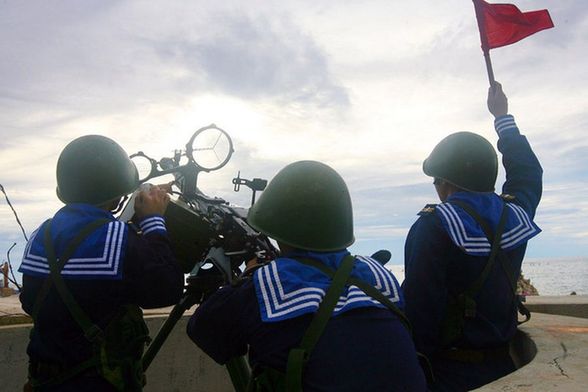Beijing warns not to escalate S. China Sea dispute
China has warned against attempts to internationalize and complicate the South China Sea issue but said it will not resort to the use of force in defusing tensions.
 |
|
Vietnamese sailors train with a 12.7mm machine gun during a naval drill Monday. |
"The recent situation in the South China Sea was due to unilateral actions taken by some countries, which damaged China's sovereignty and marine interests. These countries made groundless and irresponsible remarks in an attempt to expand and complicate the South China Sea issue. That is the cause of the problem," Chinese foreign ministry spokesman Hong Lei said Tuesday.
"China is committed to a peaceful resolution of the South China Sea issue through bilateral dialogues and consultations with related parties. We will not resort to the use of force or the threat of force," he said. "China is safeguarding its own legitimate rights, not infringing upon others," Hong said.
Beijing's statement comes a day after Vietnam conducted live-fire artillery training in the South China Sea and the country's Prime Minister Nguyen Tan Dung signed an order on eligibility for military conscription.
Over 100 people demonstrated in Hanoi again on Sunday against what they see as bullying behavior by Beijing, after protesters took to the streets in Hanoi and Ho Chi Minh City on June 5.
Hanoi is sending a message to China that Vietnam "has significantly upped the ante in this dispute," said Ian Storey, a security analyst with the Institute of Southeast Asian Studies in Singapore, AFP reported.
However, Vietnam appeared to be in a dilemma and was cautious in its response for fear of worsening tensions.
Nor do Vietnamese leaders want the momentum of nationalist demonstrations to lead to something larger and harder to suppress that could complicate their relationship with China, according to Stratfor, a US-based think tank.
Since the protests, state media has emphasized that the protest was not anti-Chinese in nature, but a demonstration linked to specific legal arguments in support of Vietnamese sovereignty, it said.
The Philippines announced Monday that it had started to use the name "West Philippine Sea" to refer to the South China Sea.
Meanwhile, Joey Salceda, the governor of the Philippine province of Albay, proposed a boycott of products made by China, but presidential spokesman Edwin Lacierda said the government would keep healthy trade and investment relations with China despite the maritime dispute.
US senator Jim Webb, who heads the Senate Foreign Relations subcommittee on East Asia, urged Congress on Monday to pressure China over the issue, AFP reported.
"I think we in our government have taken too weak of a position on this. We should be working in a multilateral forum to solve these problems," he was quoted as saying.
It threw its support Tuesday behind the Philippines as US Ambassador Harry Thomas said, "I assure you, in all subjects, we, the US are with the Philippines," Manila-based news website Sun Star reported.
The US angered China last year by asserting that Washington had national security interests at stake in the peaceful resolution of disputes in the South China Sea, the AP reported.
"The US seems to have sketched out vague security guarantees for countries such as Vietnam and the Philippines. Washington therefore is able to further flare up conflicts in the South China Sea so as to counter China," Ji Qiufeng, a professor at the School of Foreign Relations at Nanjing University, told the Global Times.
It is unlikely, however, that the US will offer tangible military support to these nations, Ji added.
China declared indisputable sovereignty over the Xisha Islands and the Nansha Islands, and their adjacent waters.
Countries including Vietnam, Brunei, Indonesia, Malaysia and the Philippines lay claim to parts of the South China Sea, which contains important shipping routes and is also believed to contain rich oil and gas reserves.
 0
0 







Go to Forum >>0 Comments